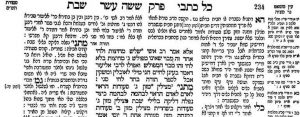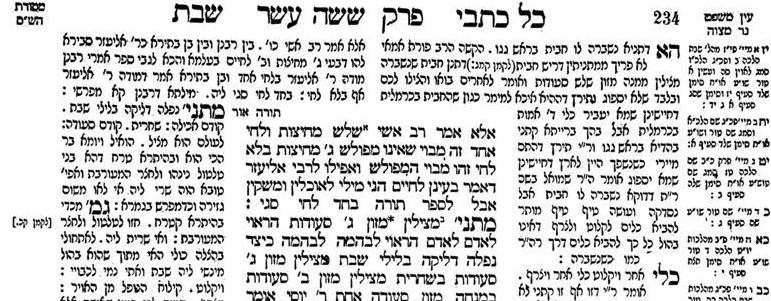
These divrei Torah were adapted from the hashkafa portion of Rabbi Yissocher Frand’s Commuter Chavrusah Tapes on the weekly portion: CD #1073 – Bracha Achrona – How Fast Or Slow Must One Eat? Good Shabbos!
The Metzorah Brings Himself to the Kohen
The pasuk in Parshas Tazria says, “If a person (Adam) will have on the skin of his flesh a s’eis or a sapachas, or a baheres, and it will become a tzaraas affliction on the skin of his flesh; he shall be brought to Aaron the Kohen…” [Vayikra 13:2] The majority of Parshas Tazria (and for that matter Parshas Metzorah as well) deals with the laws of Tzaraas.
The Netziv in his Ha’Amek Davar Chumash commentary quotes a Zohar that notes four different ways the Torah refers to human beings. The highest and most complementary of those terms is the term Adam.
If that is the case, it is somewhat strange that the Torah begins the section dealing with the laws of Tzaraas using the terminology of Adam. A person who receives Tzaraas as a punishment has not been behaving 100% properly. The Talmud [Eruchin 15b] lists all the sins that can cause these skin blemishes (negaim). The primary sin that causes Tzaraas is slander (lashon ha’rah). In fact, the Hebrew term Metzorah (someone who has Tzaraas) is a contraction of the words Motzi Rah [he speaks evil]. The Talmud there also links the word Tzaraas with the term Tzaar Ayin [stingy] and says that gasus ha’ruach [haughtiness] is also a cause of Tzaraas. It is for this reason that the atonement ritual for one who has been stricken with Tzaraas is to bring a cedar tree and a moss (Etz Erez v’Eizov), to blend that which was so tall and majestic with that which is so lowly. Birds are also part of the Metzora‘s sin offering, since birds are constantly chirping, (indicating to him that he too has been constantly using his mouth more than is appropriate).
Therefore, we are not dealing here with a Tzadik Yesod Olam [righteous person who represents the foundation of the world]. Out of all the expressions for a human being, we would have expected a less prestigious term than Adam. The Torah could have used the words Ish or Gever. Adam refers to “the glorious man,” yet the person who is smitten with Tzoraas is “inglorious man.”
Rav Nissan Alpert, in his sefer Limudei Nissan, offers a beautiful thought on this question: The difference between an Adam Chashuv [a distinguished person] and a non-Adam Chashuv [a non-distinguished person] is not whether from time to time he slips and commits sins. A person can be an “Adam” and he can be a distinguished individual who the Torah considers “Adam” despite the fact that he may be guilty of slander, haughtiness, and stinginess. Rather, the difference that distinguishes the “Adam” from the “Ish” [the less distinguished individual] is the willingness on his part to admit that he has made a mistake and that he is willing to improve.
The Torah speaks of the person who has been stricken with Tzaraas and says “v’huuva el Aharon HaKohen” [he shall be brought to Aharon the Priest]. The word “huuva” utilizes the Pual conjugation – meaning, “He is brought…” Who is bringing him? Is he not bringing himself? The answer is that he does not really want to go, but he knows that he needs to go.
We can compare this to someone who is not feeling well. He knows he needs to go to the doctor, but he is afraid to go to the doctor. The doctor will tell him he is overweight and stressed out and his cholesterol is too high. The doctor will read him the riot act for his unhealthy behaviors and life style. The doctor will put him on a diet, and he will not be able to eat his favorite deserts. He does not want to go. This is a fact of life. Many people are afraid to go to the doctor. They do not want to hear what the doctor is going to say. The same is true for someone who has a toothache. He is afraid to go to the dentist.
The pasuk is talking about a person who realizes that he is not feeling well and that he needs to do something about it. “It is difficult, but I am going to go to the doctor!” Similarly, “Adam” – yes, he has fallen; he has sinned; he has sinned seriously; but he wants to get better. He knows he is sick and wants to do something about it. That distinguished the “Adam” from the “non-Adam.” Even though it is difficult for someone to admit he is wrong and needs improvement, he is brought to Aharon the priest. You know who brings him? He brings himself! Because of that, the Torah affords him the special title of Adam.
Do Koreans Have Talmud in Their Seoul?
In the beginning of Parshas Tazria, Rabbeinu Bachaye has a lengthy discussion on the life of the embryo in the mother’s womb. It is a most unique existence during which the embryo sees from one end of the universe until the other. One of the facets of that existence is something the Talmud says in Tractate Niddah [30b] namely, that the fetus is taught the entire Torah in utero. The Gemara there says that when the baby is about to be born, an Angel appears, slaps the baby on the mouth, and he forgets all his Torah.
This would then seem like an exercise in futility. The commentary of Rav Bezalel Ronsburg asks that very question on that Gemara: Why did Hashem see fit to teach a child the entire Torah before he comes into the world, only to make him forget everything right before he is about to be born? The Ribono shel Olam did us all a great favor. Before we come down to this world of physicality, we learn all the Torah, because were it not for that experience of having learned Torah at a prior time, we would have no chance to relate to Torah in this world when we would again be exposed to it. It is because we already had Torah implanted within us, and because our brain waves have been hard-wired to grasp Torah thought processes, that we can hope to relate to and appreciate Torah when we again come into contact with it.
It is essential to have been inculcated with Torah prior to in any way becoming corrupted by the physicality and coarseness of this world, so that our pristine souls may absorb the spiritual nature of supernal Torah studies and make them suitable receptacles for its later reabsorption after our coming into contact with the impurities of this world.
Our purest existence is those nine months in our mother’s wombs. There we are saturated with all of Torah’s depth, beauty and holiness. Later, when we learn Torah in this world, the soul will remember what it once learned in that pristine state of being.
When we sit down today – as an adult or a child – and study Torah, we can have the sensation “Hey, I learnt this already!” Therefore, I can now understand it, because I already learned it. People remember something they already learned previously better that something that is brand new.
He beautifully uses this idea to interpret the statement in Tractate Megillah [6b] “If you have studied diligently and find, believe” (ya’gaata u’matzata – ta’amin) – meaning if you persevere and study Torah over and over, you will eventually certainly gain understanding of it. We refer to something we once had and we lost as a “metziah“. If we persevere in our quest of Torah, we can always get it back.
I say this over because recently someone sent me an article that said the Koreans decided to teach Talmud to all the children in the country. The article specifically mentions that they will be learning the Gemara at the beginning of Tractate Beitza regarding an egg laid on Yom Tov. The Koreans took note of the fact that there are so many smart Jews and there are so many Jewish Nobel Prize Laureates! The Koreans tried to figure out what the Jews do that makes them intelligent. They concluded that it must be because the Jews learn Gemara. Now mothers in Korea, according to this article, are teaching their young children Talmud.
I am trying to picture this in my head: A Korean mother sits down with her toddler and teaches “Beitzah shenoldah b’Yom Tov…” Maybe they will know what an egg is, but what is Yom Tov? At the time, I e-mailed Rabbi Meir Zlotowitz, Z”L the publisher of Art Scroll. I told him – this is a dedication opportunity for Art Scroll! The Hyundai Edition of Talmud Bavli. Now you are talking serious money.
I could not fathom – how could they teach it? Then I saw this teaching of Rav Bezalel Ronsburg. The only way a person can understand Torah is because he had it while yet in his mother’s womb. I am very very doubtful that the Angel teaches the Nations of the World Torah. We can get Torah because the Malach taught it to us while we were yet in our mothers’ wombs.
Transcribed by David Twersky; Jerusalem [email protected]
Technical Assistance by Dovid Hoffman; Baltimore, MD [email protected]
This week’s write-up is adapted from the hashkafa portion of Rabbi Yissochar Frand’s Commuter Chavrusah Series on the weekly Torah portion. A listing of the halachic portions for Parshas Tazria is provided below:
- CD# 007 – Self-Defense
- CD# 051 – Moser: The Dilemma of the Jewish IRS Agent
- CD# 094 – Hallel on Yom Ha’Atzmaut?
- CD# 142 – Eyeglasses in Halacha
- CD# 189 – Mikveh: Tevillah and Chaziza
- CD# 279 – Women’s Testimony in Hilchos Niddah
- CD# 325 – The Microscope in Halacha
- CD# 369 – Bris Millah That Causes Chilul Shabbos
- CD# 413 – Speaking Lashon Horah on Baalei Machlokes
- CD# 457 – Getting an Aliyah After Childbirth
- CD# 501 – Milah and the Sick Baby
- CD# 545 – Dangerous Medical Procedures
- CD# 589 – Pidyon Haben – Daytime or Night?
- CD# 633 – Lashon Harah and Lashon HaTov
- CD# 677 – Tallis Koton — Wool or Cotton?
- CD# 721 – Eruv Pesach – Mores Special Than You Think
- CD# 765 – How Many Mitzvos of Sefira Are There?
- CD# 809 – Netilas Yadayim – Things You Never Knew
- CD# 853 – Mila on Shabbos: Fascinating Questions
- CD# 897 – Insights Into Sefiras Ha’Omer
- CD# 942 – Kiddush Hashem – Is Everyone Obligated?
- CD# 984 – “What’s Tonight’s Sefira?” and other Sefira Issues
- CD#1028 – Davening Maariv Early: Does it Make it Tomorrow?
- CD#1073 – Bracha Achrona – How Fast Or Slow Must One Eat?
- CD#1115 – Office Lashon Horah – How Far Must You Go To Avoid It?
- CD#1157 – But the Butcher I Buy From Has a Reliable Reputation!
- CD#1201 – The Shabbos Bris and the Borei P’ri Ha’gefen
- CD#1246 – Wearing Sunglasses on Shabbos? Contact Lenses? A Lens that Popped Out? and other “Glasses on Shabbos” Issues
- CD#1288 – An Aliyah After Your Wife Gives Birth Revisited
- CD#1333 – Oops! There is a Sticker on the Kli I Just Toiveled – Must I Toivel It Again?
A complete catalogue can be ordered from the Yad Yechiel Institute, PO Box 511, Owings Mills MD 21117-0511. Call (410) 358-0416 or e-mail [email protected] or visit http://www.yadyechiel.org/ for further information.


